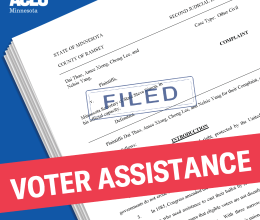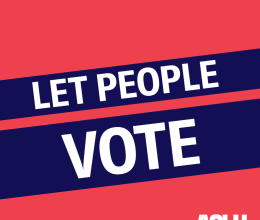
The ACLU of Minnesota just won the right for voters to get assistance from the person of their choice at the polls.
State law barred political candidates from helping someone cast a ballot, despite that voter asking for help because they have a physical disability or cannot read English. State law also made it a crime for anyone to assist more than three people facing these same challenges.
Ramsey County District Judge Thomas Gilligan entered an order on Tuesday that concluded these restrictions on voting assistance violate both the Federal Voting Rights Act and the Supremacy Clause of the U.S. Constitution. “Minnesota does not have the authority to enforce a criminal law that is preempted by the Supremacy Clause of the United States Constitution,” according to the order in Dai Thao et al. v. the Minnesota Secretary of State Steve Simon.
Secretary Simon agreed that the restrictions are preempted and, therefore, unenforceable. Under the order, the Secretary must post foreign language signs at polling sites informing Minnesotans that “any voter who requires assistance to vote by reason of blindness, disability, or inability to read or write may be given assistance by a person of the voter’s choice, other than the employer or agent of that employer or officer or agent of the voter’s union.”
The Secretary of State also agreed to inform county attorneys and election officials of the change and to revise training materials.
“The ACLU of Minnesota is pleased we were able to reach agreement with the Secretary of State that this law clearly violated the Constitution and Voting Rights Act, and was unenforceable,” said ACLU-MN staff attorney David McKinney. “Voting is a fundamental right in our democracy, and a state law that made it harder for people with disabilities or language barriers to vote could not stand. This order is a recognition that Minnesotans should be able to get any assistance they need with voting.”
The ACLU of Minnesota sued on behalf of Dai Thao, a candidate for office who faced criminal charges after helping an elderly Hmong neighbor who needed help seeing and translating her ballot; community organizers Nelsie Yang and Amee Xiong; and Chong Lee, a first-generation Hmong American born in Thailand who had needed help voting. The charges against Thao had previously been dismissed.
"For many years I have fought to rid our democracy of unfair barriers that limit citizens’ ability to exercise the basic right to vote,” Thao said. “I am grateful to the judge and the Secretary of State for making sure no one will be wrongfully prosecuted for helping voters in the future.”
Pro bono counsel included Michael Florey and Veena Tripathi of Fish & Richardson; and Joseph Dixon and Alethea Huyser from Fredrikson & Byron P.A.
The ACLU-MN is a nonprofit, nonpartisan organization that works to defend the civil liberties of all Minnesotans. Learn more at www.aclu-mn.org.
